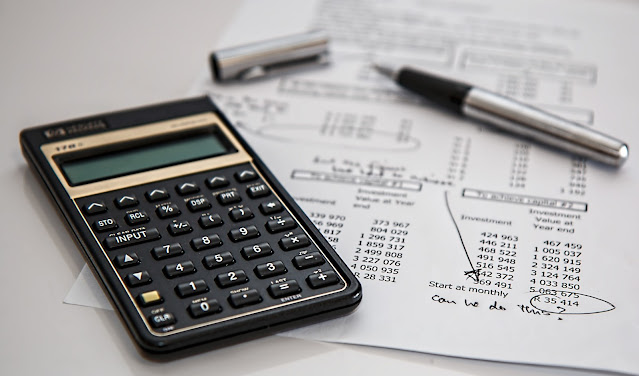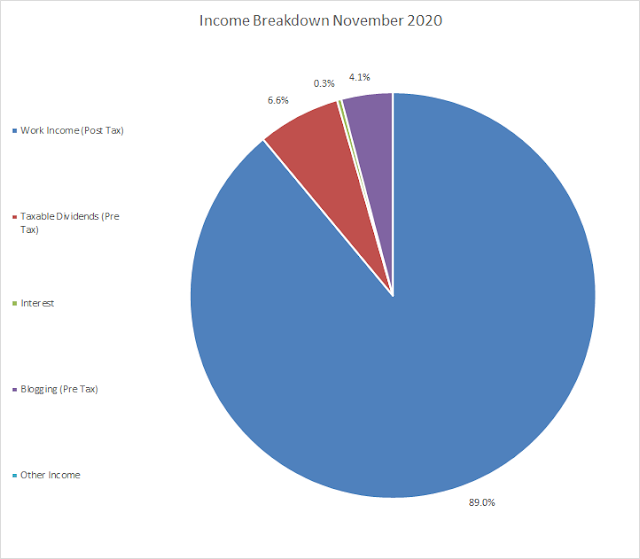Budget Check & Cash Flow Update - November 2020
 |
| Budget Check & Cash Flow Update - November 2020 |
The saying goes that cash is king. While that's true, a more accurate saying when it comes to finances is that CASH FLOW is king. Whether you're retired, still working or just starting out the only way you can improve your financial house is to have positive cash flow.
If you're in the accumulation phase then that positive cash flow allows you to save and invest to build up your future cash flow. If you're already retired, or FIREd, then congratulations because I'm sure your cash flow is well above what you need.
When it comes to personal finance it's rather simple: income - expenses = savings and savings x investing x time = financial independence. There's obviously two main levers there and while we'd all like to increase our income, many times reducing expenses is some of the low hanging fruit that you can go after to increase your savings.
Budget Check
Total income for November was the lowest I've had in quite a while. However, after-tax income was still a solid $5,401.39 for the month. That was well below the TTM average which now sits at $7,684.37. Unfortunately I do expect that to continue trending down; however, it's not something I'm too concerned with considering the huge increase in improved work-life balance. The bulk of my income, ~89%, came from my day job, le sigh; although that should come as no surprise since we're still in the accumulation phase. Dividends were the next largest income source at 6.6% with interest and writing accounting for the remaining 0.3% and 4.1%, respectively.
Total expenses for November came in at $3,842.36 which is continuing the trend of lower expenses. Considering that includes $1,500 of extra debt payments on the car loan I'm more than happy with that. The TTM average now sits at $4,538.73.
Looking at just core expenses, November's total came to $1,996.93 which was a nice tick back down after October's temporary increase. The TTM average for my core expenses declined again to $3,065.13. Looking at just the last 8 months since I switched into my new job role the average monthly core expenses are $2,238.02.
For the month we ended up with a net positive cash flow of $1,559.03 when looking at all income sources. Based on just work income, but including all expenses, the net positive cash flow came to $963.28.
Our savings rate from all income sources came to 29% while our savings rate from work income alone was 20%.
*A few notes about the cash flow check in. All income is only income that I receive and does not include my wife's income likewise for the expenses. We've found it's easiest for us to just keep separate accounts since I'm gone most of the time for work. Also, pre-tax withholding for the 401k (I currently withhold 7% in order to get the full 5% employer match) and the ESPP through my employer (4% post tax withholding) are not included in the above savings amount.
Net Work Cash Flow
While my net cash flow above includes all income and all expenses, I wanted to get a more granular look at the cash flow that is available each month. So I started calculating my Net Work Cash Flow which is calculated as post-tax income only from my work and core expenses. Think of it more like a free cash flow for a business.
The above might be the true cash flow each month; however, it's not really representative of our "free cash flow" each month. The idea is that all other income sources outside of work income are already going directly into savings or investing or in the case of dividends remaining in the brokerage account. On the expense side the majority of our expenses fall into the core side and most of the other expenses are extra debt payments rather than further discretionary spending.
I believe this gives a better idea of our "free" cash flow each month that can/will be used for debt reduction, saving and investing.
My net work cash flow was one of the lowest it's been in quite a while. However, with it still coming in at a healthy $2,808.71 I can't really complain. The 6-month average is still a solid $3,638.05 and if I can maintain those levels moving forward I'll be extremely happy as it will allow plenty of cash flow for other purposes.
Non-Work Cash Flow
Passive income for November totaled $375.10 and covered 18.8% of core expenses. Meanwhile, non-work income totaled $595.75 and covered 29.8% of core expenses for November.
Conclusion
I now have 8 full months in my new job role and as such believe that I have a good idea of what a "normal" month will look like. There will obviously be fluctuations month to month due to changes in both income and expenses. Considering all of the benefits of the new job role I'm more than happy to see that we should have somewhere between $3-4k to work with each month for debt reduction or investing.
We're debating a bit on the plan over the next few months because there's a lot of things competing for our cash flow. The big change is going to come most likely in early April when the new baby decides to come. Luckily my employer pays bonding leave so I'll keep a decent chunk of my income coming in; although my wife's doesn't, so additional cash on hand would obviously be a nice luxury to have.
Of course we're also really looking forward to getting rid of the car note on my vehicle which at the current pace would be gone sometime in March. Given the sizable emergency fund that we currently have I am tempted to just use a chunk of it to pay off the loan now. That would be a nice Christmas present to ourselves.
We're also likely to re-finance the mortgage on our house early in 2020. It was something we've been mulling over, but if we can do a no-cost refi and reduce our monthly expenses by $100-$200 that's just money in the bank even if we aren't planning on staying on this house for too much longer.
Make sure you sign up to receive new posts to your email so you don't miss anything. And be sure to follow me on Twitter @JC_PIP to get up to the minute news of purchases for my portfolio or if you prefer Pinterest or Facebook I'm on there too.
Do you think we should take some of our cash savings and pay off the loan on my car to be done with it now or just keep paying it off through cash flow and get it paid off sometime in March?



Comments
Post a Comment